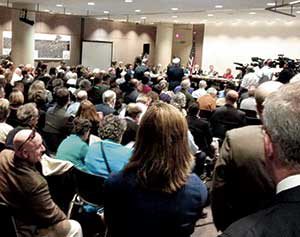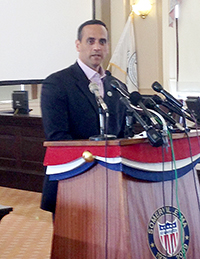
A fired-up group area residents attended the MassDOT board/FMCB meeting on Monday, with many arguing in favor of seeing the GLX project through to completion. — Photo courtesy of the MBTA
By Josie Grove
For the first time in months, Green Line Extension supporters have reason to hope. At a packed meeting on Monday afternoon, the MassDOT board of directors and the MBTA fiscal management and control board voted to provisionally allow the embattled project to move forward.
Last summer, the Green Line Extension project ran off the rails when its costs swelled from $1.992 billion up to nearly $3 billion. In December 2015, the MBTA cancelled all the construction contracts. MassDOT then brought in Jack Wright of engineering consulting firm Weston and Sampson to oversee the design of a scaled-back version of the line.
Since January, the project has undergone a process of what Wright has called “value engineering,” stripping the extension down to its essentials. In place of enclosed stations, the GLX will have open platforms. Bridges were simplified, a maintenance facility was downsized, and the Community Path Extension was rerouted and cut 3,000 feet short. At public meetings this past winter, residents have had an opportunity to respond to aspects of the redesign, and they turned out by the hundreds to demand that the GLX be built.

Somerville Mayor Curtatone announced the city’s plan to contribute $50 million to the GLX’s construction costs last week. — Photo by Josie Grove
The redesign still includes the same seven stations as the original project (including the Union Square spur), the same frequency of service and number of cars. All these changes have produced cost savings. Wright announced on Monday that the redesigned GLX would cost $2.28 billion.
According to the presentation on Monday, the redesigned GLX will meet the requirements of the Full Funding Grant Agreement, and can therefore maintain the $996 million grant from the Federal Transportation Administration. But the FTA will still needs to review the redesign to make sure.
If the GLX keeps the $996 million from the FTA, the Commonwealth still has to reprocure $996 million, its earlier commitment. Together, the total would only be $1.992 billion.
That leaves a gap of almost $300 million.
Last week, the Boston Metropolitan Area Planning Council announced it would shift $152 million in federal money toward the GLX, money that had been earmarked for a later phase of the Green Line to extend it to Route 16 in Medford.
And last Thursday, the cities of Somerville and Cambridge announced that they would seek to contribute $50 million and $25 million respectively to the Green Line project. “It’s a decision we did not come to lightly,” said Somerville mayor Joseph Curtatone. “Our communities have many critical needs, so many infrastructure needs, but the Green Line Extension is so critical.”
It is unusual for municipalities to contribute to a state infrastructure project, said Curtatone, but he believes it has become necessary. “The rules have changed. We’re in a new paradigm. The funding of major transportation infrastructure projects is becoming a challenge.”
In addition to funding challenges, Monday’s presentation also addressed management challenges. Management consultants recommended the GLX project be given more staff and more autonomy within the MBTA, and warned against giving too much power to outside consultants.
For some, all of this is a distraction. Amid growing enthusiasm for the GLX at Monday’s meeting, transportation secretary Stephanie Pollock said the MBTA should focus on its existing infrastructure, which has, by some estimates, a repair backlog over $6 billion. Pollock said that the project should be cancelled again if its construction interferes with the T’s existing service. Ironically, in a previous job with the Conservation Law Foundation, Pollock helped make the Green Line Extension a legal commitment under the Clean Air Act, to compensate for the increased pollution created by car traffic after the Big Dig.
Mayor Curtatone recalled that legal commitment last Thursday. “I’ve made it very clear, we would not relinquish our legal rights,” he said. “The realities are harsh, but the realities would be even harsher if they just dismissed the project from the onset.”















The project is hampered (justifiably) by the BDS (Big Dig Syndrome). The Big Dig, at great expense, had a boondoggle of of alleged expertise, consultants, watchdogs, etc., who did not do their jobs. Multiple cost over runs, plans that had to be forwarded to the federal government for final approval like the rail line connecting North Station to South Station to be included in the tunnel project and was never done, thus eliminating that phase of he project. Here we have the GLX where it appears that no one figured in inflation costs when pricing the project.
Meanwhile Transportation Secretary Pollock repeatedly, including the recent meeting, that the present infrastructure is the priority and the GLX takes a seat behind it. She is correct. Ten or more bridges, costing tens – hundreds of million dollars many which had already been rebuilt within the last 25 years, all to be done again when in fact they could have used the existing track instead of needlessly rebuilding bridges.
Thank you ritepride. At this point they are finally doing what they should have done from the start in a way. Now that they have totally screwed up in designing this it is most possible with no money to be had and an already deeply in debt transit system in need of upgrades that this may never happen. Complete lack of common sense and greed.
You’d think they’d have learned their lesson from the Big Dig, but apparently history is doomed to repeat itself again.
Maybe we should opt out of trying to do anything like this if those in charge of it have memory issues.